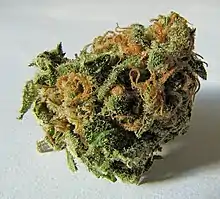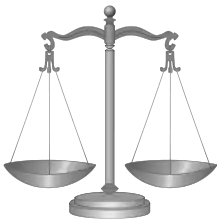Misdemeanor
A misdemeanor (American English,[1] spelled misdemeanour in British English) is any "lesser" criminal act in some common law legal systems. Misdemeanors are generally punished less severely than more serious felonies, but theoretically more so than administrative infractions (also known as minor, petty, or summary offences) and regulatory offences. Typically misdemeanors are punished with monetary fines or community service.
| Criminal law | |
|---|---|
| Elements | |
| Scope of criminal liability | |
| Severity of offense | |
|
|
| Inchoate offenses | |
| Crimes against the person | |
|
|
|
| Sexual offences | |
| Crimes against property | |
| Crimes against justice | |
| Crimes against the public | |
|
|
| Crimes against animals | |
| Crimes against the state | |
| Defences to liability | |
| Other common-law areas | |
| Portals | |
|
|
Distinction between felonies and misdemeanors
A misdemeanor is considered a crime of lesser seriousness, and a felony one of greater seriousness.[2] The maximum punishment for a misdemeanor is less than that for a felony under the principle that the punishment should fit the crime.[3][4][5] One standard for measurement is the degree to which a crime affects others or society. Measurements of the degree of seriousness of a crime have been developed.[6]
In the United States, the federal government generally considers a crime punishable with incarceration for not more than one year, or lesser penalty, to be a misdemeanor. All other crimes are considered felonies.[7] Many states also employ the same or a similar distinction.[8]
The distinction between felonies and misdemeanors has been abolished by several common law jurisdictions, notably the UK[9] and Australia.[10] These jurisdictions have generally adopted some other classification (in the UK the substance of the original distinction remains, only slightly altered): in the Commonwealth nations of Australia,[11] Canada,[12] New Zealand,[13] and the United Kingdom,[14][15] the crimes are divided into summary offences and indictable offences.[16] The Republic of Ireland, a former member of the Commonwealth, also uses these divisions.[17]
In some jurisdictions, those who are convicted of a misdemeanor are known as misdemeanants (as contrasted with those convicted of a felony who are known as felons). Depending on the jurisdiction, examples of misdemeanors may include: petty theft, prostitution, public intoxication, simple assault, disorderly conduct, trespass, vandalism, reckless driving, indecent exposure, and possession of cannabis for personal use.
When a misdemeanor becomes a felony
In the United States, even if a criminal charge for the defendant's conduct is normally a misdemeanor, sometimes a repeat offender will be charged with a felony offense. For example, the first time a person commits certain crimes, such as spousal assault, it is normally a misdemeanor, but the second time it may become a felony.[18] Other misdemeanors may be upgraded to felonies based on context. For example, in some jurisdictions the crime of indecent exposure might normally be classified as a misdemeanor, but be charged as a felony when committed in front of a minor.[19]
Penalties
Misdemeanors usually do not result in the restriction of civil rights, but may result in loss of privileges, such as professional licenses, public offices, or public employment. Such effects are known as the collateral consequences of criminal charges. This is more common when the misdemeanor is related to the privilege in question (such as the loss of a taxi driver's license after a conviction for reckless driving), or when the misdemeanor is deemed to involve moral turpitude—and in general is evaluated on a case-by-case basis.
United States
In the United States, misdemeanors are typically crimes with a maximum punishment of 12 months of incarceration, typically in a local jail as contrasted with felons, who are typically incarcerated in a prison. Jurisdictions such as Massachusetts are a notable exception; the maximum punishment of some misdemeanors there is up to 2.5 years.[20] People who are convicted of misdemeanors are often punished with probation, community service, short jail term, or part-time incarceration such as a sentence that may be served on the weekends.
The United States Constitution provides that the President may be impeached and subsequently removed from office if found guilty by Congress for "high crimes and misdemeanors". As used in the Constitution, the term misdemeanor refers broadly to criminal acts as opposed to employing the felony-misdemeanor distinction used in modern criminal codes.[21] The definition of what constitutes "high crimes and misdemeanors" for purposes of impeachment is left to the judgment of Congress.[22]
Singapore
In Singapore, misdemeanors generally are sentenced to months of jail sentence but with individual crimes suspects are sentenced to a harsher sentence. The penalty of vandalism is a fine not exceeding S$2,000 or imprisonment not exceeding three years, and also corporal punishment of not less than three strokes and not more than eight strokes of the cane.
Misdemeanor classes
Depending on the jurisdiction, several classes of misdemeanors may exist; the forms of punishment can vary widely between those classes. For example, the federal and some state governments in the United States divide misdemeanors into several classes, with certain classes punishable by jail time and others carrying only a fine.[23] In New York law, a Class A Misdemeanor carries a maximum sentence of one year of imprisonment, while a Class B Misdemeanor "shall not exceed three months".[24]
Unclassified misdemeanors
In the United States, when a statute does not specify the class of a misdemeanor, it may be referred to as an unclassified misdemeanor.[25] Legislators usually enact such laws when they wish to impose penalties that fall outside the framework specified by each class. For example, Virginia has four classes of misdemeanors, with Class 1 and Class 2 misdemeanors being punishable by twelve-month and six-month jail sentences, respectively, and Class 3 and Class 4 misdemeanors being non-jail offenses payable by fines.[26] First-time cannabis possession is an unclassified misdemeanor in Virginia punishable by up to 30 days in jail rather than the normal fines and jail sentences of the four classes.[26][27] New York has three classes of misdemeanors: A, B, and Unclassified.[28]
England and Wales
All distinctions between felony and misdemeanour were abolished by section 1(1) of the Criminal Law Act 1967.[29]
References
- "misdemeanour". Cambridge Dictionary. Cambridge University Press. Retrieved 29 June 2017.
- "Classification of Crimes". M Libraries Publishing. University of Minnesota. Retrieved 29 June 2017.
- Doing Justice: The Choice of Punishments, A VONHIRSCH, 1976, p.220
- Criminology, Larry J. Siegel
- An Economic Analysis of the Criminal Law as Preference-Shaping Policy, Duke Law Journal, Feb 1990, Vol. 1, Kenneth Dau-Schmidt, JSTOR 1372651
- Offense Seriousness Scaling: An Alternative to Scenario Methods, Journal of Quantitative Criminology, Volume 9, Number 3, 309-322, doi:10.1007/BF01064464 James P. Lynch and Mona J. E. Danner,
- "18 USC 3559: Sentencing classification of offenses". uscode.house.gov. 1 November 1987. Retrieved 6 April 2017.
- Larson, Aaron. "What is a Misdemeanor". ExpertLaw. Retrieved 29 June 2017.
- "Criminal Law Act 1967". legislation.gov.uk. The National Archives. Retrieved 3 December 2018., s.1, in force 1 Jan 1968
- Crimes Act 1958 (Vic., Australia) s. 332B(1), Crimes Act 1900 (NSW., Australia) s. 580E(1)
- Justice, VOC, Department of. "Types of offences". www.victimsofcrime.vic.gov.au. Retrieved 2017-01-27.
- Justice, Ministry of; General, Ministry of Public Safety and Solicitor. "Types of Offences - Province of British Columbia". www2.gov.bc.ca. Retrieved 2017-01-27.
- "Offence categories & types of trials | New Zealand Ministry of Justice". www.justice.govt.nz. Retrieved 2017-01-27.
- "Summary Offences and the Crown Court: Legal Guidance: The Crown Prosecution Service". www.cps.gov.uk. Retrieved 2017-01-27.
- "Criminal courts - GOV.UK". www.gov.uk. Retrieved 2017-01-27.
- "What is the difference between a summary and indictable offence?". www.findlaw.com.au. Retrieved 2017-01-27.
- Prosecutions, Office of the Director of Public. "Guidelines for Prosecutors - Director of Public Prosecutions". www.dppireland.ie. Retrieved 2017-01-27.
- Bergman, Paul, and Sara J. Berman-Barrett. The Criminal Law Handbook: Know Your Rights, Survive the System. Berkeley, CA: Nolo, 2011. Print.
- See, e.g., "Ohio Revised Code, Sec. 2907.09, Public indecency". LawWriter Ohio. Retrieved 16 April 2019.
- "Felony and Master Crime List" (PDF). www.mass.gov/courts. Massachusetts Sentencing Commission. December 2015. Retrieved 27 January 2017.
- "Schick v. United States, 195 U.S. 65, 24 S.Ct. 826, 49 L.Ed. 99 (1904)". Google Scholar. Retrieved 29 June 2017.
- Bowman, Frank O.; Sepinuck, Stephen L. (1999). "High Crimes and Misdemeanors: Defining the Constitutional Limits on Presidential Impeachment". Southern California Law Review. 72 (6): 1517. Retrieved 29 June 2017.
- See, e.g., 18 U.S.C. § 3559
- N.Y. Penal L. § 70.15 (1), (2). Found at New York State Assembly website. Accessed August 6, 2013.
- See, e.g., "Criminal Justice System for Adults in NYS". Office of Mental Health. New York State. Retrieved 19 November 2017., "Misdemeanor and Criminal Violation Cases". Lane County Circuit Court. Oregon Judicial Department. Retrieved 19 November 2017.
- § 18.2-11. Punishment for conviction of misdemeanor, Code of Virginia.
- § 18.2-250.1. Possession of marijuana unlawful, Code of Virginia.
- N.Y. Penal L. § 55.05 (2). Found at New York State Assembly website. Accessed August 6, 2013.
- O. Hood Phillips. A First Book of English Law. Sweet and Maxwell. Fourth Edition. 1960. Page 151.
External links
 The dictionary definition of misdemeanor at Wiktionary
The dictionary definition of misdemeanor at Wiktionary


